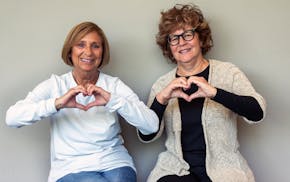One morning in June, at her home off a dirt road outside Duluth, Sharon McMahon tended to her many channels.
An interview for the newsletter she'd just launched needed transcribing. Posts about upcoming Supreme Court cases needed preparing. And the text on the book jacket for her upcoming book needed approving.
And, as always, there were her Instagram followers — 1.1 million on her public account, 20,000 on a private book club account — who had questions for her. About the upcoming presidential debate, sure, but also about her gardens. "Pink pine cone update," she posted, with a snapshot from her yard.
As her fame has grown, McMahon, who dubs herself "America's Government Teacher," has hired a team of 10 people to help with her ever-growing number of projects: the podcast, "Here's Where it Gets Interesting"; the private book club, which boasts a waitlist; and the paid newsletter, "The Preamble," which has gained nearly 220,000 subscribers since its start this summer. (Disclosure: McMahon will also be a contributor to Strib Voices.)
But the 47-year-old former government teacher is still the one writing, hosting and posting.
This week, McMahon is out with her first book, "The Small and the Mighty," which highlights Americans — most of them women, some of them teachers — who changed the course of history but who were written out of history books. Who fought for women's suffrage, who built thousands of schools, who penned "America the Beautiful."
"These are the kinds of stories that I have always found interesting. It's always been people that don't have their name on a monument or have a marble bust in some state capitol," McMahon said. "I think those are fascinating stories to tell. Like, does the world actually need another book about George Washington?"
She is the book's narrator, making introductions, raising an eyebrow and chiming in with a "Friends" reference.
McMahon believes in these stories, these people, some of whom she found via newspaper archives. Big, needed change "is going to come from people who just decide to do things and don't wait to have the perfect plan," she said in June, sitting at her kitchen table. "They don't wait for somebody to be like, 'I designate you.' They don't wait for all the conditions, all the stars to align. ...
"Systemic change will come from individuals who just decide to do stuff."
That certainly could describe McMahon herself, who, after being a government teacher, a yarn entrepreneur and a portrait photographer, made her first explainer about the Electoral College in 2020 using props from her photo studio: a bucket, a box and a basket full of pine cones. But it also hints at a more ambitious goal. With her nonpartisan analysis and golden retriever energy, McMahon is breaking through folks' political fatigue and news aversion, arming her followers — most of them women, some of them teachers — with the knowledge they need to change things.
It's the nonpartisan reason why, in the book, she rejects former President Donald Trump's slogan, "Make America Great Again."
"It is us," she writes, "the small and mighty, who make America great, not again, but always."
"We perhaps fall trapped to this idea that great Americans are people of the past," McMahon said. "And I think that causes us to feel this sense of, like, fatalistic nihilism, like nothing can change, everything's kind of set in stone, that there's no hope for the future.
"So, to me, it's important to know that, yes, great Americans lived. They did live, and some of them are in this book. But great Americans still live."
'Where the trust comes in'
McMahon grew up in Duluth, a block from the library. She loved books and the idea of being an author someday. But "always from the perspective of 'Oh, it would be so great to be a pop star.' "
She was too busy with teaching, too busy with children. Then, in 2021, as her SharonSaysSo social media accounts took off, enlisting hundreds of thousands of so-called "Governerds," editors and agents approached her about writing a book. A memoir, maybe, or a guide to how government works. She started and stopped, started and stopped.
Then she wrote a chapter not about herself but about history — not about Alexander Hamilton but about his lesser-known best friend Gouverneur Morris, who wrote the preamble to the U.S. Constitution. And, suddenly, "everything fell into place."
Most books about history are still written by men, published by men and "consequently, a lot of history readers are men," she said. So, she asked herself: How do you write history that appeals to men and women? Don't get her wrong — not "history for girls."
But maybe featuring fewer tanks.
"So much history that's been written is about conquest," she said. "It's military exploits. ... It's not to say that women can't understand the importance of these topics, but it's just that tanks are less intrinsically interesting to an American, female audience."
"Men need to read about more than tanks, too. It's good for them."
McMahon has honed her character-centered history lessons via her "Governerds insiders," an $18-a-month book club and private Instagram group that offers members "deep dives" on topics including, lately, the Underground Railroad.
Minneapolis resident Whitney Leigh Carlson first heard about McMahon from her sister, who lives in France. They grew up in Georgia and in recent years, partly because of the misinformation swirling, it became hard to have civil conversations with some of their relatives. McMahon offered an antidote and a respite.
"As someone who can be very overwhelmed by the amount of noise," Carlson said, "it's a peaceful place to learn."
Carlson said McMahon is consistently fair, "but she's not neutral," Carlson said. Over the years, McMahon has spoken out against racism, against corruption. She has dismantled the argument that teachers ought to be armed and, citing scripture, has supported gun control laws, including universal background checks. "We are allowing our children to be sacrificed on the altar of our firearm worship," she wrote in her newsletter this month, after yet another school shooting.
The money she and her Governerds have raised — $10 million, so far — illustrates some of the issues that matter to her: $2 million for teachers, $2 million for Undue Medical Debt and nearly $1 million for World Central Kitchen, according to McMahon's team.
"She has things she really believes in, that she doesn't shy away from," said Carlson, a photographer and mother. "But she also doesn't tie any moral superiority to, specifically, a political party. Or a news source. Or a person. That's where the trust comes in."
Last year, Carlson invited Twin Cities-based Governerds to take a walk around Lake Harriet and a field trip to the Minnesota African American Heritage Museum and Gallery. Carlson knew that if they were following McMahon, "they're not going to be mean." Since then, a core group has gotten close.
When a teacher at Lucy Laney Elementary School asked for donations to fund her annual holiday party, the local Governerds raised more than $2,000.
'Not a thirst trap'
In early August, McMahon became one of the first people, journalist or otherwise, to interview VP candidate Tim Walz. (She made a request to speak with JD Vance, too, she assured her followers.) She shared the wild tale of the Walz interview with her newsletter subscribers: She'd landed a sit-down talk with the Minnesota governor before his first rally with Harris in Eau Claire, Wis. But weather delayed his plane, and the interview had to move backstage. So, to make it, McMahon arrived via motorcade.
"I did not have motorcade on my bingo card," McMahon said later, laughing.
She got to ask just four questions. Among them: "What do you want to tell America's teachers?"
McMahon doesn't share how she votes. Her followers sometimes ask her if she'll run for office, and she tells them no. A few years ago, a reporter for the Atlantic searched her voting records and earliest social media posts, "trying to uncover evidence that she was a secret liberal activist or closeted Trump donor." (She found none.)
McMahon gets it. "There's so much distrust that ... everybody has to have a secret motive," she said, "and that is a more comfortable way for some people to explain the world than, 'Somebody is just a good person, doing their best.' "
On a Sunday night in June, McMahon's face appeared beside bestselling author Kristin Hannah on Zoom, and quickly, hundreds of the thousands of people gathered for McMahon's book club sent a flurry of hellos and emojis.
"Hello everyone!" McMahon said, as the screen filled with floating hearts.
"Listen," she said to Hannah, her tone playfully stern, "we have some questions for you, Kristin!"
McMahon launched an hourlong conversation with Hannah about her book, "The Women," a Vietnam War-era epic about a military nurse that, on McMahon's recommendation, her book club had devoured and discussed, eager for the private audience with Hannah. They talked about war, about writing. But the emojis picked up again when they began discussing how Hannah, then a lawyer, decided to switch careers, becoming a writer.
"You can do this at 60, you can do this at 70, you can decide to change your life and change your path whenever it works for you. ..." Hannah said as McMahon nodded. "It can take a while to find the strength and the money and everything else to change course."
In the chat, someone raised McMahon's 2021 appearance on "The Daily Show," where host Trevor Noah marveled that her account was popular not because she was posting beautiful locations, thirst traps or memes: "It is popular because you give people facts." Since then, McMahon has milked the idea that she is "not a thirst trap" for laughs.
But it hints at a broader befuddlement about McMahon's popularity. The media sometimes portrays McMahon as "Wow, a Minnesota mom does X, Y, Z," she said. "And listen, there's nothing wrong with being a Minnesota mom. I'm a proud Minnesota mom. ... But there's also an underlying sexism about it."
McMahon doesn't make so-called mom content. She doesn't post her kids. If someone asks her for parenting advice, "I'm like, 'I don't know,' " she said, laughing. "I got nothing."
"There is this persistent desire to cast women in the public eye as either hot or a mom," she said. "It's ridiculous that those are the only options, that I can't just be somebody with ideas."
But some of McMahon's appeal is personal. She shares her joys and her struggles, her knitting projects and her outfit try-ons. She cries on camera.
Paying Governerds also get access to a private Instagram account where McMahon films behind-the-scenes thoughts in a bathrobe and glasses, or roams her gardens wearing a visor, pointing out what's blooming. Her kids don't appear, but her two dogs do, and McMahon often posts videos of little Ginny, a beagle, sniffing or bounding or attempting to steal her popcorn.
Last spring, on both accounts, she shared news that her 2-year-old dog, Penny, who loved to run fast and steal socks, had died after being hit by a car in their driveway.
When her followers heard, they sent her hundreds of cards and, unprompted, made thousands of dollars in donations to the Duluth humane society. They also sent things they knew McMahon loves, like wind chimes and rose bushes and a needlepoint pattern with Penny's picture on it.
"It's a reminder that there are real people on the end of this, right?" she said, her blue eyes welling with tears.
On that day in June, the area where McMahon's family buried Penny was still marked by a circle of rocks and sticks and one of Penny's favorite balls. Nearby, the yellow roses that someone sent, someone McMahon had never met, were blooming.

18 dance and theater events to catch outdoors in Minnesota this summer

Embrace Minnesota's growing seasons at these 76 farmers markets

Old School Jewish Matchmakers offer timeless perspective on dating

